While you cannot make a self-signed cert and set the Enhanced Key Usage parameters using makecert I thought I'd save everyone the trouble of trying to use go down the path of using OpenSSL to generate a cert on Windows. Instead, you can use certreq (which is available if you already have makecert) and fashion your own request to set the required parameters.
For example, this sets up a cert with an EKU of Document Encryption (1.3.6.1.4.1.311.80.1) and key usages of Key Encipherment and Data Encipherment.
Create a new file, MyCert.inf:
[Version]
Signature = "$Windows NT$"
[Strings]
szOID_ENHANCED_KEY_USAGE = "2.5.29.37"
szOID_DOCUMENT_ENCRYPTION = "1.3.6.1.4.1.311.80.1"
[NewRequest]
Subject = "cn=me@example.com"
MachineKeySet = false
KeyLength = 2048
KeySpec = AT_KEYEXCHANGE
HashAlgorithm = Sha1
Exportable = true
RequestType = Cert
KeyUsage = "CERT_KEY_ENCIPHERMENT_KEY_USAGE | CERT_DATA_ENCIPHERMENT_KEY_USAGE"
ValidityPeriod = "Years"
ValidityPeriodUnits = "1000"
[Extensions]
%szOID_ENHANCED_KEY_USAGE% = "{text}%szOID_DOCUMENT_ENCRYPTION%"
Just set the Subject to whatever you need.
Then run:
certreq -new MyCert.inf MyCert.cer
This will generate the public key (X509 cert) and install it to your Current User personal store on the machine. You can export it from there if you want.
I used this to generate a certificate for encrypting PowerShell DSC, for testing.

For more details: https://technet.microsoft.com/en-us/library/dn296456.aspx#BKMK_New
